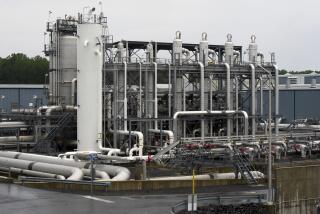OPEC Cut Cited in Call to Boost U.S. Oil Output
- Share via
WASHINGTON — With consumers facing a possible increase in gasoline prices at the pump, President Bush’s Energy secretary said Saturday that the decision by major foreign oil producers to slash output emphasizes the need to increase production within the United States.
“OPEC’s decision [late Friday] demonstrates the importance of increasing America’s domestic production and developing a national energy policy that will ensure a stable, reliable, affordable and diverse supply of energy,” Energy Secretary Spencer Abraham said. He added: “There is an urgent need to strengthen America’s energy security.”
Abraham’s comments came in reaction to an agreement by the Organization of Petroleum Exporting Countries to cut its targeted oil output by 4%--1 million barrels a day. The action by the 11-nation cartel could raise prices for crude oil and the refined gasoline that powers Americans’ automobiles and trucks.
The cutback will take effect April 1, OPEC said. The nations’ output quota will fall to 24.2 million barrels a day from the current level of 25.2 million barrels. OPEC members pump almost 40% of the world’s oil.
Abraham called OPEC’s action “disappointing.” His staff said he would assess what he termed America’s “energy crisis” at a conference Monday in Washington, hosted by the U.S. Chamber of Commerce.
For Americans who remember well the long lines at gasoline pumps and the inflationary spiral driven by energy prices of the 1970s, current conditions may seem short of crisis proportions. But the specter of higher gasoline prices as the summer travel season approaches--combined with the ongoing power crunch in California and other Western states--presents the Bush administration with a serious challenge.
Sen. Charles E. Schumer (D-N.Y.) called on Bush to consider using the nation’s Strategic Petroleum Reserve to ease the effect of the foreign producers’ announced cutback.
“With the U.S. economy sagging, the net result of this decision [by OPEC] will only fuel speculation about a possible recession,” Schumer said Saturday. “Higher oil prices mean more of a financial burden for everyday consumers, which would likely mean economic stress in the very countries OPEC counts on to buy its oil.”
Former President Clinton authorized tapping the strategic reserve during the 2000 presidential campaign, when pump prices rose to more than $2 a gallon in some areas after years of stability.
The OPEC production announcement comes just days after Bush renounced a pledge he made during that campaign to trim America’s emissions of carbon dioxide, the odorless gas suspected of contributing to a warming of the Earth’s atmosphere. Bush’s turnabout pleased U.S. business leaders who viewed the decision as prudent for the domestic economy--but others saw it as a potential step backward from leadership on the threat of global warming.
Abraham did not specify how or where he would like to see the U.S. increase its energy production. But Bush has made clear that he favors a broad approach, including opening the pristine Arctic National Wildlife Refuge to exploration.
Bush’s position puts him at odds with environmental organizations that have long opposed opening the refuge. Over the last week, for instance, the Audubon Society has placed television ads calling for opposition to drilling in the refuge, located on Alaska’s North Slope.
A Gallup survey conducted early this month questioned 1,060 Americans about the seriousness with which they viewed the nation’s “energy situation.” The response: 31% viewed it as “very serious,” 59% chose ‘fairly serious” and 9% said “not at all serious.”
Other responses in the same poll suggested that Bush faces a challenge if he is to persuade Americans to back increased production to meet energy needs. When asked to choose from three “potential solutions,” 56% favored more conservation by consumers, compared with 33% who favored emphasizing production of more oil, gas or coal. And 8% said they favored ‘both equally.” The poll’s margin of error was plus or minus 3 percentage points.
More to Read
Inside the business of entertainment
The Wide Shot brings you news, analysis and insights on everything from streaming wars to production — and what it all means for the future.
You may occasionally receive promotional content from the Los Angeles Times.











